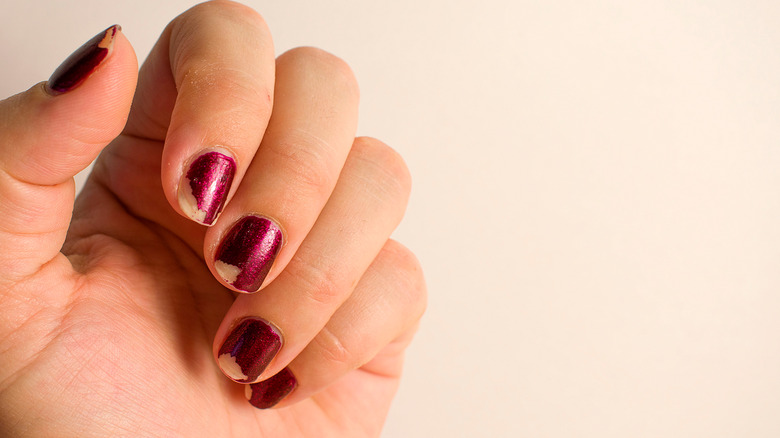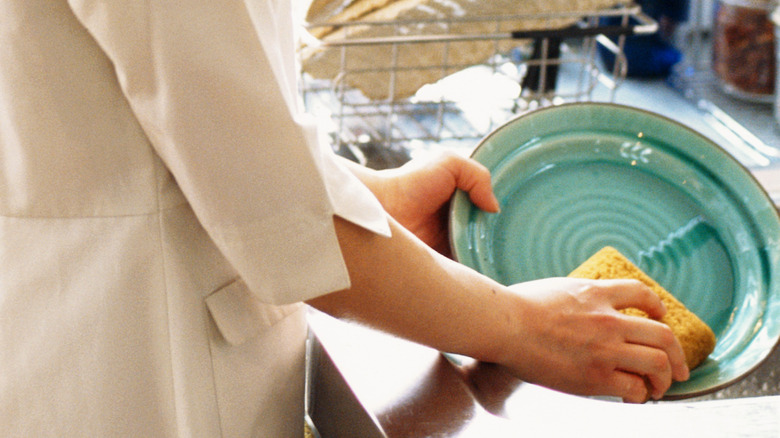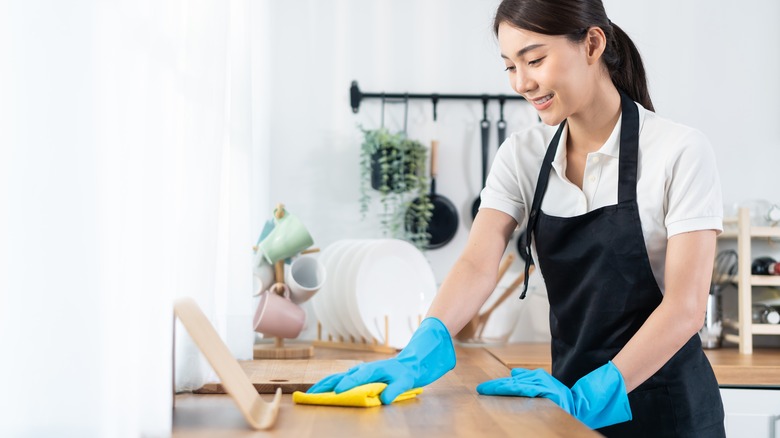The Household Chore That Could Be Ruining Your Fresh Manicure
Many of us likely have childhood memories in which we recall adults in our lives wearing long rubber gloves when doing dishes and other household tasks. While it may have looked funny to us, those gloves were being used to protect hands from hot water and harsh chemicals associated with day-to-day chores. It's likely that some of those adults in our lives were also trying to protect manicures.
Today, wearing gloves like that seems to be less of a trend, yet manicures are still highly popular. In fact, rather than just the classic lacquer-based mani, we now have options for everything from gel manicures to nail stickers to powder polish to press-on nails to multiple types of professionally-applied false nails. Because some of these options are touted as lasting longer and holding up better than traditional lacquer, we might think we are immune to chore-related damage to our manicures. In fact, that's not the case.
If you're noticing that your mani isn't lasting as long as you'd expect it to, or if you are experiencing chipping, peeling, or other issues earlier than you'd hope, consider the household chores you're doing everyday; they might be a factor.
Specific chores that take the worst toll on your mani
The most likely household chores to wreak havoc on your manicure are probably happening in the kitchen. The combination of hot water and harsh soap while doing dishes can make that mani brittle and prone to chipping. Further, when you use your hands to scrub stuck-on messes like those on counters, stovetops, and dishes themselves, the repeated thumping of your nails on the surfaces can cause quick damage to your nails and any polish or adhesive you have on them (via Insider).
Further, anything alcohol-based can also remove nail polish, so if you are using alcohol do disinfect surfaces, electronics, etc., you are likely seeing the results via a chipped manicure. Harsh chemicals in other types of disinfecting supplies from wipes to bleach can also harm not only your manicure, but your skin as well, causing dryness, irritation, and even burns and rashes in the worst cases.
But these chores are necessary to keep a clean and safe home. So how can you protect your hands and that shiny new mani?
Protect your hands
Well, first of all, Mom and Grandma were onto something when they wore those crazy-looking rubber gloves in the kitchen. Wearing gloves any time you are washing dishes, scrubbing surfaces, or disinfecting parts of your home will not only help protect your manicure, but will also help prevent any type of harm or skin irritation that could result from coming in direct contact with harsh cleaning agents.
In addition to wearing gloves, you could consider replacing some of the harsher chemicals in your home with more natural cleaning products. For instance, in place of bleach, consider hydrogen peroxide; it can kill germs, help whiten and remove stains, and also kill mold (via Real Simple). Vodka, which is usually 80 proof, can also be used to kill germs and to combat mold and mildew. It can also be a great replacement for Febreze, as spraying vodka onto smelly clothes or fabrics and then letting it dry kills odor-causing bacteria without leaving behind chemical smells or synthetic fragrances.
Along these same lines, lemon and vinegar can help scrub and remove stains from surfaces. And let's not forget the sanitizing power of water when it is turned into steam; home steamers can help clean everything from couches to hard surfaces and floors.
But once again, even if you choose to switch to less-harsh cleansers like these, wearing gloves is essential to protecting that fresh manicure! If you have a latex allergy, nitrile gloves might be best for you.


